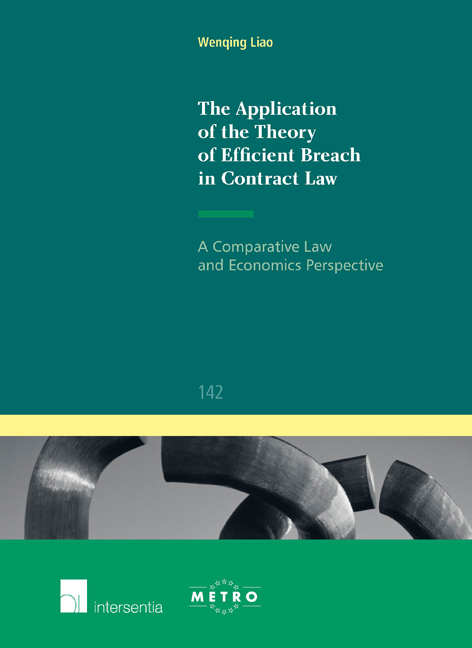 The Application of the Theory of Efficient Breach in Contract Law
The Application of the Theory of Efficient Breach in Contract Law Book contents
- Frontmatter
- Acknowledgements
- Contents
- List of Abbreviations
- List of Tables
- Chapter 1 Introduction
- Chapter 2 Economic Analysis of Contract and Contract Law
- Chapter 3 Efficient Breach in Law and Economics Theory
- Chapter 4 A Re-Examination of the Optimal Rule to Enhance Efficiency
- Chapter 5 Alternative Remedies and Efficient Breach
- Chapter 6 Efficient Breach and European Union Contract Law
- Chapter 7 Efficient Breach and Re-Negotiation in English Sales Law
- Chapter 8 Applying the Efficient Breach Doctrine to Chinese Commercial Sales Law
- Chapter 9 A Comparative Law and Economics Analysis of Efficient Breach in English Law, EU Law and Chinese Law
- Chapter 10 Concluding Remarks and Policy Recommendations
- References
- Table of legislation and European or international instruments
- Cases
- Valorization Addendum
- Ius Commune Europaeum
Chapter 3 - Efficient Breach in Law and Economics Theory
Published online by Cambridge University Press: 12 December 2017
- Frontmatter
- Acknowledgements
- Contents
- List of Abbreviations
- List of Tables
- Chapter 1 Introduction
- Chapter 2 Economic Analysis of Contract and Contract Law
- Chapter 3 Efficient Breach in Law and Economics Theory
- Chapter 4 A Re-Examination of the Optimal Rule to Enhance Efficiency
- Chapter 5 Alternative Remedies and Efficient Breach
- Chapter 6 Efficient Breach and European Union Contract Law
- Chapter 7 Efficient Breach and Re-Negotiation in English Sales Law
- Chapter 8 Applying the Efficient Breach Doctrine to Chinese Commercial Sales Law
- Chapter 9 A Comparative Law and Economics Analysis of Efficient Breach in English Law, EU Law and Chinese Law
- Chapter 10 Concluding Remarks and Policy Recommendations
- References
- Table of legislation and European or international instruments
- Cases
- Valorization Addendum
- Ius Commune Europaeum
Summary
It has been noted that the commercial transaction involves a core undertaking of utility maximization. A contract that is extended into the future is faced with a major problem of uncertainty, which may be exacerbated by being incomplete and potentially opportunist. As a result, people may not always have an incentive to adhere to what they agreed. On this basis, the introduction of contract law is assumed to offer people good rules and to facilitate their capacities of welfare maximization. On the one hand, the law may ideally fill in the gaps in a contract; on the other hand, the law may offer people incentives to behave efficiently. One of the most important mechanisms provided by contract law is the remedy rules. Accordingly, it is assumed that people can make their decisions of breach or performance taking into consideration their loss incurred by the legal remedy. In this Chapter, we will focus on a promisor's decision of breach and recognize a situation where breach is desirable and preferable. Section 1 will first give an overview of the doctrine of efficient breach in existing literature. An ideal model of efficient breach will be given and the formula for it will be explained in section 2. Afterwards, section 3 will summarize two types of contingencies that probably alter the utility of a contract and hence make it efficient for the parties to breach the contract. The concluding remarks will be provided in section 4.
What is the Efficient Breach Theory?
Why Do People Breach?
As has been observed, people make contracts because they think that by so doing they can increase their utility. At the time when two parties sign a contract, each one expects a profit. But why do the parties later breach a contract which they previously considered as profitable? There are at least three economic reasons for the breach:
Uncertain risks: It is stated that transaction is costly so that it is impossible for the parties to specify all the contingencies and draft a complete contract. In this sense, provided that a simultaneity condition doesn't hold, the actual value and cost in a contract is uncertain at the time when it is made.
- Type
- Chapter
- Information
- The Application of the Theory of Efficient Breach in Contract LawA Comparative Law and Economics Perspective, pp. 45 - 62Publisher: IntersentiaPrint publication year: 2015
